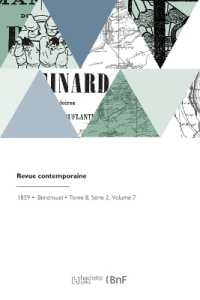- ホーム
- > 洋書
- > 英文書
- > Philosophy
Full Description
The role of silence in democratic settings should be rehabilitated. Democratic theories are concerned with mechanisms and institutions that counteract silence in society. As a supplement to this, it is first demonstrated that we must not forget how silence determines the significance and meanings of utterances made. Secondly, that silence can be used as a critical tool to get better listening, more open conversations, and greater thoughtfulness in the public sphere. The widely recognized freedom of expression should thus be supplemented with a freedom of silence, a freedom to let silence disturb the discursive relevance criteria.
Contents
Foreword
List of Illustrations
1 Introduction
1 The Main Argument
2 Practical Challenges and Theoretical Clarifications
2.1 Language and Silence
2.2 Democracy and the Public Sphere
2.3 Linguistic Abstractions and Paradoxes
2.4 Continuity and Change
2 Abstractions in the Public Sphere and Individual Freedom
1 Abstractions in the Public Sphere
1.1 Immanuel Kant
1.2 Georg Wilhelm Friedrich Hegel
1.3 The Sceptics - Karl Marx, Friedrich Nietzsche and Søren Aabye Kierkegaard
2 The Liberal Tradition
2.1 James Madison
2.2 John Stuart Mill
2.3 Joseph Aloïs Schumpeter
2.4 Walter Lippmann
3 John Dewey's Rethinking of Reason and Individuality
4 Summary
3 Individuality and Community in the Public Sphere
1 Hannah Arendt
2 Jürgen Habermas
2.1 Habermas' Theory of Communicative Action
2.2 Habermas and the Democratic Public Sphere
3 The Demand for Transcendence
4 The Linguistic Focus of Communicative Exchanges
1 The Legacy of Hermeneutics
2 Communicative Decoupling of Critical Reflection
2.1 Prerequisites for Communicative Exchanges
2.2 Language as a Negotiation of Relevance
2.3 Invisible Relevance Criteria
2.4 Decoupling from Rationality
3 Silence as a Path into and out of Communicative Exchanges
5 Silence as a Prerequisite for Communicative Exchange
1 The Many Faces of Silence
1.1 Silence as Lack of Sound
1.2 The Possibility of Thinking beyond Language
1.3 Contradictory Themes of Silence
2 Unity of Silence
3 Art and Religion Brought to Silence
4 The Philosophical Opening of the Field of Silence
6 The Peal of Silence - Martin Heidegger
1 Why Heidegger?
2 Silence in Sein und Zeit
3 Late Heidegger
3.1 Silence in Beiträge zur Philosophie
3.2 Silence as the Grounding/Abyss for Rest and Movement
3.3 Language That Speaks as the Peal of Silence
4 Heidegger in Reflections on the Democratic Public Sphere
4.1 The Absent Awareness of the Sign
7 Writing the Unsayable - Jacques Derrida
1 Challenging the Dominance of the Voice
2 The Role of Expression in Meaning Formation
2.1 Iterability of Signs via Différance
2.2 Silence, Blankness and Mime
3 The Role of the Other in Meaning Formation
3.1 Meaning Is Not Determined Solely by Expressive Intentions
3.2 The Silent Greeting from the Absent
3.3 The Silence of Hospitality
3.4 The Silence between Friend and Foe
4 The Foundation of Deliberation in the Aporias of Silence
8 Abstract Silence as a Concrete Phenomenon
1 The Relevance of Philosophical Silence to Political Processes
2 The Rehabilitation of Silence as Democratically Productive
3 Reflective Approaches to Democratic Publicity
9 The Importance of Silence for Listening and Openness
1 What Does It Mean to Listen?
1.1 Aesthetic Listening
1.2 Listening and Democracy
2 The Challenge
3 Listening for Silence
3.1 Initial Reflections
3.2 Legitimacy
3.3 Trust
3.4 Understanding
3.5 Disagreement
3.6 Concluding Comments
4 Listening for Silence and Openness
10 Isolation and Thoughtfulness
1 The Silence of Thoughtfulness - Patience
1.1 The Silent Foundation of the Question
2 Breaks: What Is Gained by Silence in the Public Sphere
2.1 Deleuze on Silence as a Prerequisite for Creativity
2.2 Abraham's Isolation from the Public Sphere Compared to the Loneliness of the Merman
2.3 Dialling Down Intensity in the Public Sphere
3 Liberation from the Expectations of the Public Sphere
3.1 Slowness in the Public Sphere
3.2 Breaks from the Public Sphere
3.3 Breaks from the Public Sphere in the Public Sphere
4 Back to the Deliberation
4.1 Back to Habermas
4.2 Thoughtfulness through Isolation
11 Silence as the Path to a Better Public Sphere
1 The Argumentative Challenge of the Argument
1.1 Analysis of the Unavoidability of Silence
1.2 Critical Analysis of Structures for Silence
1.3 Silence as Breaks from Participation in the Public Sphere
2 Let Silence Come to Light - a Paradox
Bibliography
Index
Index
Index






